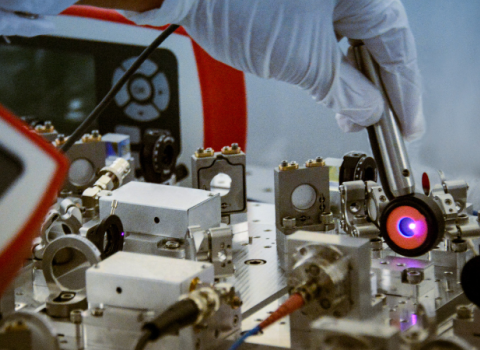Stuttgart, Munich, Berlin – The Fraunhofer-Gesellschaft, Europe's leading organization for applied research, and IBM (NYSE: IBM) announced today the signing of the agreement aimed at advancing quantum computing in Germany. The collaboration gives companies and research institutions access to IBM quantum computers in Germany and the USA under the umbrella of a nationwide Fraunhofer competence network. The aim is to research the technology, application scenarios and algorithms while generating competence development and competitive advantages for the local economy and science.
As part of the collaboration, an IBM Q System One quantum computer will be installed in a IBM computer center near Stuttgart. The system is scheduled to go into operation in early 2021 and will be the first of its kind in Europe. Fraunhofer plans to bring together established partners from research and industry under the umbrella of a research infrastructure of Fraunhofer institutes, which will work together in a centrally coordinated national Fraunhofer competence network for quantum computing.
This network has set itself the goal of further developing and transferring application-oriented quantum computing strategies under complete data sovereignty of European law and will initially be represented by competence centers in expected six German states – Baden-Württemberg, Bavaria, Rhineland-Palatinate, Berlin, Hesse and North Rhine-Westphalia. Currently, more than ten Fraunhofer Institutes are already working on various fields of quantum technology.
As early as April 1, 2020, interested companies and research institutions will have access to the world's largest group of quantum computers in the US-based IBM Quantum Computation Center under the umbrella of the nationwide Fraunhofer competence network. The IBM Quantum Computation Center currently comprises 15 systems and is located in the US state of New York. Under the terms of the agreement, IBM will offer Fraunhofer technical support and assistance in using the IBM Quantum systems.
Pioneering initiative on applied quantum computing
The signing of the cooperation follows the joint announcement of September 2019, a pioneering initiative on applied quantum computing for Germany’s research institutions and companies. The cooperation partners support the German Federal Government's goal of investing almost one billion Euros over the next two years in order to develop quantum technology from basic research to marketable applications. This is to be made possible by the development of a research infrastructure that strategically promotes the further development and dissemination of quantum computing in Germany. The participating federal states Baden-Württemberg and Bavaria contribute the largest financial share.
"A central research question is which concrete application scenarios are suitable for calculation with a quantum computer, how algorithms for this can be developed and translated into simple applications. Quantum computing has the potential to analyze the complex systems in business and industry, to unravel molecular and chemical interactions, to solve complicated optimization problems and to make artificial intelligence significantly more powerful," explains Fraunhofer President Prof. Reimund Neugebauer. "Such advances could open the door to new scientific knowledge and enormous improvements, for example in supply chains, logistics and the modelling of financial data, as well as problems from the classical engineering sciences.”
"This agreement opens up another opportunity for Europe to become a pioneer in the further development of a promising technology with Germany playing a leading role as we grow the scientific, academic, public and private ecosystem which seeks to solve complex problems, such as climate change and healthcare issues. A memorable milestone for our region”, says Martin Jetter, Senior Vice President & Chairman IBM Europe.
“The installation of the first physical quantum computer on European soil sends out a strong signal in support of Germany as a research location. It marks an important step toward the further establishment of an internationally recognizable ecosystem in the field of quantum technology,” says Helge Braun, Head of the Federal Chancellery.
“The quantum computer puts us in a strong position to help shape, at an early stage and in a decisive way, the key technologies of the future. Germany in general, and Baden-Württemberg in particular, will become the center of quantum technology in Europe. This will provide both industry and science with immense research and experimental opportunities in the fields of transportation, machine tools, communications, health care, and the finance and energy industries. Naturally, as minister-president, I am delighted that Baden-Württemberg has been chosen as the location for such pioneering technologies,” says Minister-President Winfried Kretschmann.
Hubert Aiwanger, Bavarian State Minister of Economic Affairs: “Quantum computing has enormous potential in many fields of application, including logistics, materials research, artificial intelligence and IT security. Bavaria will therefore support this initiative of the Fraunhofer-Gesellschaft with a high-performance competence center, to be led by Fraunhofer Institute for Applied and Integrated Security AISEC in Garching. One area of focus will be the interaction between quantum computing and IT security. We want to push ahead with the development of quantum computing as a new key technology for Bavarian companies.”
Nicole Hoffmeister-Kraut, Baden-Württemberg State Minister of Economic Affairs, says: “The installation of a quantum computer in Baden-Württemberg is a great achievement and an enormous opportunity for science and industry in our region. As a ‘state of hidden champions’ and one of Europe’s most innovative regions, we offer ideal conditions for this new technology as well as a host of application fields in which quantum computing can be of benefit. The availability of such immense computing power will make it possible to solve, in the shortest possible time, fundamental economic problems that currently take years to process. The state government is therefore providing 40 million euros in funding to build up the necessary expertise in industry, together with IBM and the Fraunhofer-Gesellschaft. The establishment of a competence center in Baden-Württemberg marks an important step, since it will enable us to make the most of the opportunities offered by quantum computing in the future.”
IBM System Q One
IBM System Q One is optimized to ensure the quality, stability, reliability and reproducibility of multi-qubit applications. Due to these factors and the resulting high quantum volume (a measure of the performance of a quantum computer), the IBM System Q One enables state-of-the-art research for concrete application scenarios in science and industry. In 2016, IBM was the first company to make universal quantum computers accessible via the cloud. An active community of more than 200,000 users have run hundreds of billions of executions on real IBM Quantum hardware, and have published more than 200 research papers based on these experiments. IBM is also the first company to have commercial clients via the IBM Q Network, a community of more than 100 businesses, start-ups, research labs, education institutions and governments working with IBM to advance quantum computing.
This article was first published 13 March 2020 by Fraunhofer.





 A unique international forum for public research organisations and companies to connect their external engagement with strategic interests around their R&D system.
A unique international forum for public research organisations and companies to connect their external engagement with strategic interests around their R&D system.